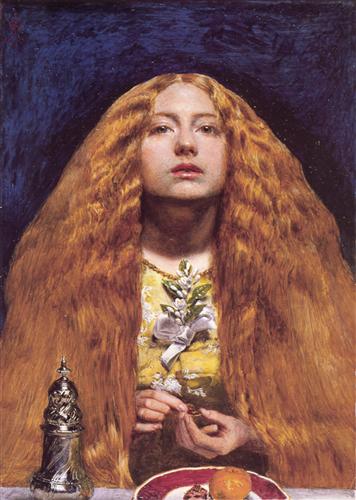The High Priestess
dwelled in a shrine flanked by the portals of Night and Day. When I approached,
she told me that her power came from the borrowed light, which sustained her
throughout every sleepless hour. Never once in her life did she yield to the hypnotic
spell of sweet somnolence. Her steely gaze could penetrate through the densest
of fog, the most blinding of sunbeam, and the murkiest of the mounting
darkness. Even the wolves were terrified of her unflagging vigilance.
Every day she
saw people, large crowds of people, streaming through the portals of Night and
Day. Some youths would leap through the threshold of the portal of Day with
their faces all rosy and jolly, only to be led out and blindfolded to the other
portal, still laughing hysterically and completely oblivious of their imminent entrapment
in a nasty prank. The High Priestess would prick her ears and wait. Normally,
it wouldn’t be more than five repeated tollings of bell when the deceived were
suddenly awake. They found themselves abandoned on a foreign land where the
comforts of warmth never touched, where any moment they expected their wretched
existence finally eclipsed by an approaching, unknown menace. One individual’s
cry of desperation was muted by that of innumerable others. None of those painful
sounds ever went unnoticed by the High Priestess, but, already made numb by
their staggering regularity, she stifled without much ado any feelings or
emotions that crossed her heart.
She also
told me that she was forbidden from saving the unfortunate ones from their
implacable misery. They were too many, she said, and it was advisable not to
bother with those whose doom was already preordained. I was taken aback by this
statement, addressed by one whose head was ever encircled by a luminous halo,
who was regarded as the guardian of all souls, in a manner that was nonetheless
so matter-of-fact, so callous. The High Priestess shrugged. There was no crime
worse than that done in the name of Loyalty, she said, I knew not any values
superior to that, this Loyalty. Even if that meant she was to assume a silent
tree the rest of her life. The High Priestess devoted herself to the
omnipresent One.
But there
were still some less tragic prospects. The High Priestess remarked that the
tears of the lost ones offered nourishments to the Land of Day as they were
carried over by the winds. Those in the Land of Night wept only for a season;
they were mostly dry-eyed before the next, crying no tears but continually
emitting a few feeble groans of pain and protest. How the High Priestess would
like them to know, even after they finally disentangled from their protracted
death, that their suffering did not go unrewarded. Every time a stranger
entered into the portal of Day he would notice immediately how the little
kingdom was blessed by eternal spring. The charity was unreciprocal, however.
If the High
Priestess could have her wish granted, she confided in me that she would like
to fellow sleep. Sleeping was a privilege and luxury she was eternally denied
of. The strange and magical sensation of dreaming, where one was constantly
slipping in and out of consciousness, would be a potent remedy for one who has
witnessed with her indifferent eyes so many forgotten tragedies. Through the
sweet act of dreaming her soul would finally be unfettered, and became her
ghostly other. She and her ghostly other would fly to the land of the ancient
fathers. And there, she said, she could finally pay tribute to myriads graves without
names.

Comments
Post a Comment